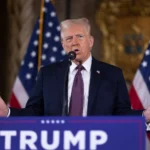Energy News Beat
He has pledged to take immediate action on issues from border security to trade.
Welcome back to Foreign Policy’s SitRep, where we are layering up ahead of President-elect Donald Trump’s inauguration on Monday, which is set to be the chilliest in 40 years. Brr.
Alright, here’s what’s on tap for the day: What to expect during Trump’s first week, Armenia tilts away from Russia, the latest on the Israel-Hamas cease-fire and hostage release deal, and an awkward confirmation hearing typo.
Welcome back to Foreign Policy’s SitRep, where we are layering up ahead of President-elect Donald Trump’s inauguration on Monday, which is set to be the chilliest in 40 years. Brr.
Alright, here’s what’s on tap for the day: What to expect during Trump’s first week, Armenia tilts away from Russia, the latest on the Israel-Hamas cease-fire and hostage release deal, and an awkward confirmation hearing typo.
Trump’s Big Day
Trump returns to the White House on Monday, and he’s poised to hit the ground running. Trump has promised to take immediate action on issues including border security, trade, and energy and is expected to sign a slew of executive orders to accomplish those goals. According to one tally from Axios, Trump has pledged to do 59 different things on Day 1.
Trump made bold, ambitious commitments while on the campaign trail, including mass deportations and ending the Russia-Ukraine war within “24 hours.” Though Trump is likely to take an aggressive approach in pursuit of his agenda, he’ll still face serious obstacles.
Here’s what you can likely expect from Trump on four key issues during the first week of his second term.
Immigration: Trump has vowed to advance his hard-line immigration agenda on Day 1, including by immediately sealing the U.S. southern border and launching “the largest deportation program in American history.” Stephen Miller, who served as immigration czar during Trump’s first term and is now Trump’s deputy chief of staff for policy, has said the incoming president plans to unleash a raft of executive orders on his first day to crack down on illegal immigration.
As part of this effort, Trump has vowed to sign an executive order on his first day in office that terminates birthright citizenship. Since birthright citizenship is a 14th Amendment right that grants U.S. citizenship to individuals born in the United States, and “subject to the jurisdiction thereof”—regardless of their parents’ immigration or citizenship status (with the exception of children born to foreign diplomats)—expect potential efforts to eliminate it to spark major legal battles.
“My policy will choke off a major incentive for continued illegal immigration, deter more migrants from coming, and encourage many of the aliens Joe Biden has unlawfully let into our country to go back to their home countries,” Trump said in a video statement in May 2023 about the birthright plan.
There is also significant uncertainty around legal immigration, with memories of the sudden travel ban on several Muslim-majority countries days after his first inauguration in 2017 still echoing. More than a dozen U.S. universities have asked their international students and faculty to return to campus before Inauguration Day on Jan. 20 in the event of another travel ban.
Russia-Ukraine war: Just days before Trump takes office, the reality of solving the almost three-year war in a single day appears to have dawned on the president-elect’s team. Trump advisors are now reversing course, admitting for the first time that the Russia-Ukraine war will likely take months to resolve—if not longer.
The strategy for achieving such a landmark agreement, though, remains largely the same. Trump has suggested that he would use the threat of sanctions and military assistance (or the lack thereof) to force Russian President Vladimir Putin and Ukrainian President Volodymyr Zelensky to come to the negotiating table. He has also appeared willing to bend to some of Moscow’s demands, including the loss of some Ukrainian territory and barring Kyiv from NATO membership.
Sen. Marco Rubio, tapped to be Trump’s secretary of state, reiterated that stance during his Senate confirmation hearing on Wednesday. “There will have to be concessions made by the Russian Federation but also by the Ukrainians and the United States,” Rubio said, adding that “sanctions and the release of sanctions” would have to be part of that conversation.
Rubio also insisted that Trump remains a staunch supporter of NATO. Yet Trump has repeatedly said he plans to place the onus of European security on Europe, suggesting that he wishes for other nations to help carry the burden of future mediation efforts.
Tariffs and trade: Trump has big plans for tariffs, and some of them may be rolled out on Day 1. In a November Truth Social post, he vowed to place 25 percent tariffs on all products from Mexico and Canada as one of his first executive orders. “This Tariff will remain in effect until such time as Drugs, in particular Fentanyl, and all Illegal Aliens stop this Invasion of our Country!” Trump wrote.
In another post that day, he also said he would place an additional 10 percent tariff on goods from China for its role in the fentanyl trade. (He has also separately threatened to hit China with tariffs up to 60 percent.)
Most tariffs undergo months of review before implementation, but Trump could potentially use a 1977 law intended for economic emergencies to levy these tariffs on Day 1.
Energy and climate: Outgoing U.S. President Joe Biden made climate policy a key feature of his administration’s agenda, including by funnelling hundreds of billions of dollars in subsidies, tax incentives, and other grants to clean energy projects over a 10-year period under his flagship climate law, the Inflation Reduction Act (IRA).
Trump has said he will immediately roll back many of his predecessor’s policies, including by eliminating what he has called a “ridiculous electric car mandate.” He has also promised to swiftly ramp up fossil fuel production. “Day one and a half, we drill,” he declared in a town hall with Sean Hannity in December 2023. “We drill, baby, drill. Drill, drill, drill.”
“Starting on Day 1, I will approve new drilling, new pipelines, new refiners, new power plants, new reactors, and we will slash the red tape,” Trump said in September 2024. He also said he would issue an executive order to “make sure that [offshore wind] ends on Day 1” and promised to “terminate” the IRA.
Let’s Get Personnel
The latest Trump nominations:
- Paul Lawrence, deputy secretary of veterans affairs
- Casey Mulligan, chief counsel for advocacy for the Small Business Administration
- Katharine MacGregor, deputy secretary of the interior
- Steven Bradbury, deputy secretary of transportation
- Bill Briggs, deputy administrator of the Small Business Administration
House Speaker Mike Johnson on Thursday selected Republican Rep. Rick Crawford to chair the House Intelligence Committee.
Trump on Thursday also announced that he’s tapped three actors—Jon Voight, Mel Gibson, and Sylvester Stallone—to be “special envoys” to Hollywood. “They will serve as Special Envoys to me for the purpose of bringing Hollywood, which has lost much business over the last four years to Foreign Countries, BACK—BIGGER, BETTER, AND STRONGER THAN EVER BEFORE!” Trump wrote on Truth Social.
On the Button
What should be high on your radar, if it isn’t already.
Moscow’s line. “This is not even up for discussion,” Nikolaoi Patrushev, an aide to Putin, said in an interview with a pro-Kremlin tabloid this week in reference to Kyiv’s push for Moscow to cede control of Ukrainian territories illegally annexed by Russia.
Striking a similar tone, Dmitry Rogozin, a member of the upper chamber of the Russian parliament who represents the occupied Ukrainian region of Zaporizhzhia, told Gazeta.ru this week that Moscow remains committed to its goal of “de-nazifying” Ukraine, echoing the Kremlin’s widely debunked justification for the war. “We will never return to the state we were in before 2022. Never. Everyone needs to understand this,” he said.
Armenia looks West. Armenian Foreign Minister Ararat Mirzoyan was in Washington this week, where he signed a strategic partnership agreement with outgoing Secretary of State Antony Blinken. The move will strengthen ties between the United States and the South Caucasus country, which has become disillusioned with Russia, its longtime security guarantor. This month, the Armenian government approved legislation endorsing the country’s pursuit of European Union membership.
“January 2025 may go down as Armenia’s geopolitical inflection point, a time when Yerevan decisively moved to shun its longtime protector Russia and pin its political and economic future on integration with Western institutions, thus scrambling the strategic balance in the Caucasus,” Ani Avetisyan wrote for Eurasianet.
Netanyahu pumps the brakes. Israeli Prime Minister Benjamin Netanyahu on Thursday said a “last-minute crisis” with Hamas had postponed a cabinet vote to approve the Gaza cease-fire agreement. Netanyahu did not expand on what the crisis entailed. The vote is now expected to occur on Friday.
The delay in finalizing the deal came as far-right ministers threatened to quit Netanyahu’s fragile coalition government if the agreement for a long-sought reprieve from 15 months of brutal fighting moved forward.
Hamas on Thursday said it remained “committed” to the deal, rejecting assertions from Netanyahu that the militant group was reneging on aspects of the agreement. Meanwhile, Blinken said he was “confident” the cease-fire would begin Sunday.
Snapshot
 The six-week Maha Kumbh festival began in India on Monday, a Hindu event that is celebrated roughly once every 144 years and is thought to be the world’s largest gathering of humanity. Some 400 million Hindu pilgrims from around the globe set to bathe in and around the Ganges River.
The six-week Maha Kumbh festival began in India on Monday, a Hindu event that is celebrated roughly once every 144 years and is thought to be the world’s largest gathering of humanity. Some 400 million Hindu pilgrims from around the globe set to bathe in and around the Ganges River.
The six-week Maha Kumbh festival began in India on Monday, a Hindu event that is celebrated roughly once every 144 years and is thought to be the world’s largest gathering of humanity. Some 400 million Hindu pilgrims from around the globe set to bathe in and around the Ganges River.Ritesh Shukla/Getty Images
Wonk of the Week
Amy began the week at Stanford University’s Hoover Institution, where the famed biographer of Soviet leader Joseph Stalin, Stephen Kotkin, shared his insights on what he termed “borders of defeat”—boundaries established through war and rebellion that are under threat of revision. Such flash points are a throughline among some of the major crises roiling the world today.
“[The Soviet Union’s] borders were borders of victory—they were in Berlin. Now you’ve got borders of defeat. Good luck trying to stabilize relations, getting to detente, getting to an understanding, with borders of defeat,” he said. “Israel? Quintessential borders of defeat, whether from the Iranian point of view or from the Palestinian point of view or many other points of view in the Middle East.”
“South China Sea, Taiwan? Borders of defeat,” Kotkin said. “How do you stabilize relations with these countries when they don’t recognize those borders as advantageous to them the way the Soviet Union did? Good luck.”
Put On Your Radar
Sunday, Jan. 19: The Israel-Hamas cease-fire and hostage release deal is set to take effect, pending approval by Israel’s war cabinet and parliament.
Monday, Jan. 20: Trump’s inauguration takes place.
The Senate Armed Service Committee is expected to vote on Pete Hegseth’s nomination to serve as U.S. defense secretary.
Monday, Jan. 20, to Thursday, Jan. 24: The World Economic Forum meets in Davos, Switzerland.
Wednesday, Jan. 23: The fifth anniversary of the Chinese city of Wuhan being placed under lockdown in an attempt to control the spread of COVID-19.
Quote of the Week
“Mediocrity has its place in government. We know that all too well,” former Trump National Security Advisor John Bolton said on CNN on Thursday, speaking about the president-elect’s cabinet nominees.
The post Trump’s Ambitious Week One Agenda appeared first on Energy News Beat.









